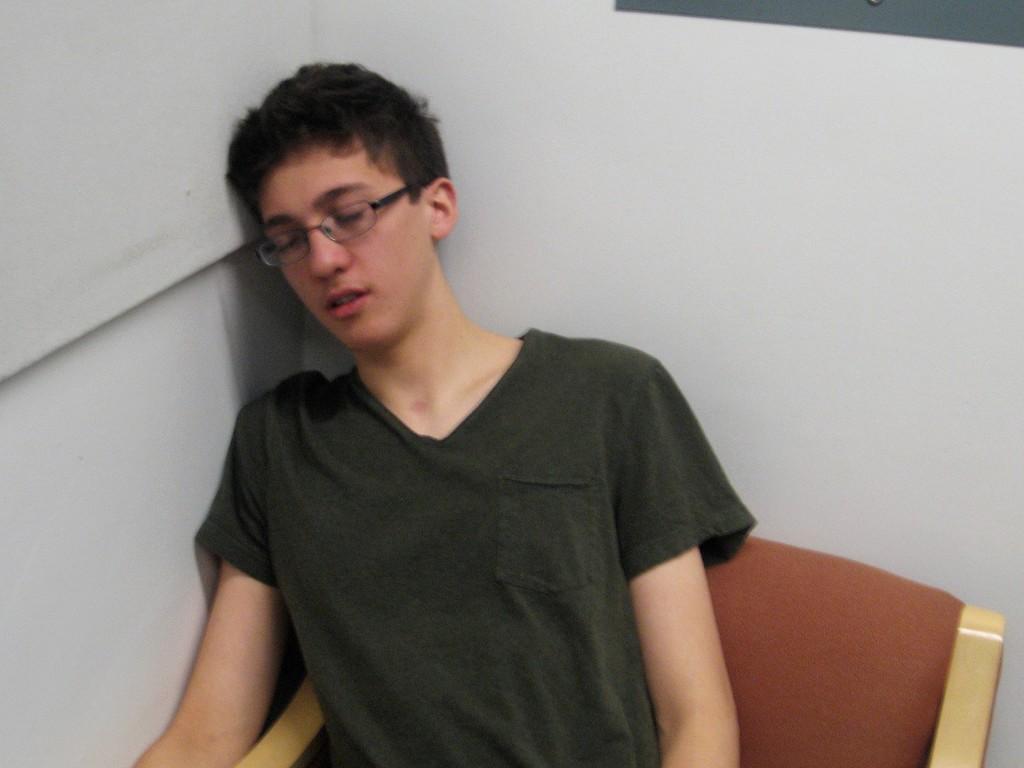After studying for a math test, science test, and Spanish presentation, you fall asleep at 2:30 a.m. Waking up exhausted and stressed, you wonder where the balance is between working hard and getting enough sleep.
Anne Vetter (’11), says she receives “less than eight hours of sleep a night, (which) makes it hard to focus on my homework. Freshman and sophomore year, I fell asleep every health class.” Teenagers currently receive an hour less of sleep than they did 30 years ago, according to The Better Sleep council’s website.
Yusef Shaheen, (’14), says that when he doesn’t get enough sleep he has “trouble paying attention in class, zones out, and struggles listening to the teacher.”
Ella Andrew, (’14), agrees and says “with less sleep it is harder for me to focus.”
Urban students’ lack of sleep is not unusual. American teens are having trouble balancing schoolwork with healthy sleep patterns. Only 15 percent of teens receive enough sleep, according to the National Sleep Foundation. Sixty percent of high school teens report extreme daytime sleepiness, most teens need between eight and nine hours of sleep a night, and over 20 percent of high schoolers reported they have fallen asleep during class, according to a New York Magazine article.
Megan Madden (’12) tries to prioritize sleep over her work. According to Madden, it has a “positive influence on my schoolwork because it allows me to be more productive.”
Madden is wise to prioritize her sleep. According to a 2011 study from the Palo Alto Medical Foundation, teenagers who got more sleep get better grades than teenagers with less sleep. Sleep is considered food for the brain, and impacts one’s memory and quality of work.
Many Urban students agree: lack of sleep contributes to unhappiness and stress. Vikram Chan-Herur (’13) says he “definitely feels happier and more productive when [he] get[s] enough sleep.” Lucia Ligamari, (’13), agrees, and says that lack of sleep makes her “more stressed and nervous.”
Urban teachers can tell when a student lacks sleep. History teacher LeRoy Votto says he knows when “kids lack energy and focus; (they) look like they are just dragging.”
Depression can contribute to sleep problems, and sleep problems can contribute to depressive disorders. Both insomnia and obstructive sleep apnea are linked with depression. A July 2011 Psychology Today article headlined “Sleep and Depression” explained that “one or two nights of deliberate sleep can result in lifting of mood symptoms for some depressed patients.”
Kaern Kreyling, school counselor, believes “people can use the phrase of being sleepy as a cover story for other emotions. People can talk about depression through not sleeping enough.” Kreyling adds, “people have a lot to say about sleep. Sleep can stand for (someone’s) troubles.”
Lilia Leshan, who will be taking over role as counselor in the spring, believes there is “importance in dreaming because it is a way to process one’s thoughts. Everyone gets to be a filmmaker in (one’s) dreams. (They are) uncontrolled, and a way of digesting the good and the bad.”
Lack of sleep is taking a toll on the emotional health of Urban students. Abby Schantz (’14) says she is “more irritable” with less sleep. Similarly, Hannah Berk (’15) says she “gets annoyed easier without sleep and feels less patient.”
According to WebMD, a health website, the effects of sleep such as impaired memory, mood, and other functions can become a chronic way of life which will affect one’s long-term job and relationships.
Besides affecting our moods, sleep also affects our athletic performance. According to Urban’s athletic director, Greg Angilly, “sleep gives the body and mind a chance to unwind. Students put so much pressure (on themselves) academically that we need to let our bodies rest. We struggle on Thursdays and Fridays in athletics, (it is) the weight of the week catching up with us.”
Anna Schutte (’13) has “less motivation to move” when she feels exhausted. According to Nate Cohen (’13), with less sleep he feels the effect on his athletic abilities because he gets “tired really fast.”
How do you know if sleepiness is a problem, and how can you get more sleep? According to the American Psychological Association, here are the six steps to get a better night’s sleep.
- Make sleep a priority. Establish a bedtime and wakeup time and stick to it. A consistent sleep schedule will help you feel less tired since it allows your body to bet in sync with its natural patterns.
- Make your room a sleep haven. Keep it cool, quiet, and dark during the night.
- No pills, vitamins, or drinks can replace good sleep. Consuming caffeine close to bedtime can hurt your sleep.
- Don’t eat, drink, or exercise within a few hours of your bedtime.
- Try to avoid the TV, computer, and telephone an hour before you go to bed.
- If you do the same things every night before you go to sleep, you teach your body the signals that it’s time for bed.

